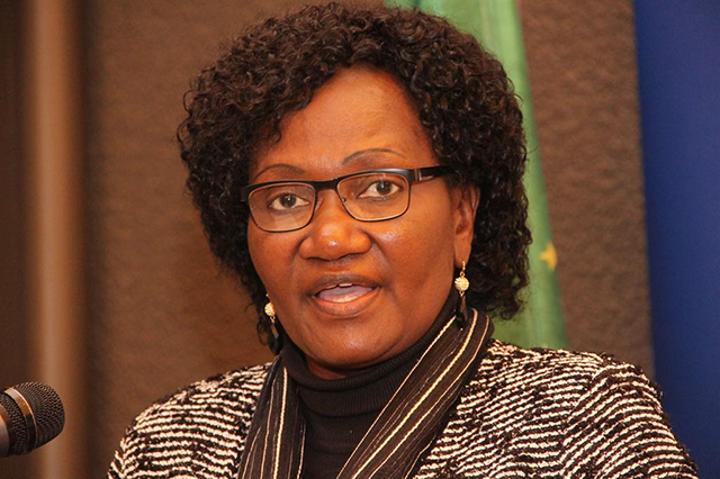Africa-Press – Namibia. THE Namibia Students Financial Assistance Fund (NSFAF) will soon revert to a directorate in the Ministry of Higher Education, Technology and Innovation, minister Itah Kandjii-Murangi confirmed yesterday.
The plan to restructure the fund has been coming since 2017 when Kandjii-Murangi said it would become a directorate in her ministry as per president Hage Geingob’s wishes, although the law under which the entity was founded would first have to be repealed.
However, the same minister in 2018 said they continue to push ahead with plans to turn the students fund into a department in her ministry – despite concerns that the Cabinet has not endorsed the move.
The ministry then placed advertisements in newspapers, inviting consultancies to “assess the status of the NSFAF”. A committee headed by the higher education ministry has been established for the restructuring of the fund, with the Ministry of Finance being part of it.
The fund’s board chairperson, Klemens /Awarab, says when he joined the NSFAF in 2018, the decision was already made for it to be restructured. “A study was made that said there was a need for the fund to become part of the ministry,” he says.
The head of the fund, Kennedy Kandume, says they received a formal notification of the Cabinet’s decision in March this year. He says he understands the decision to move the institution back to the ministry is a Cabinet decision, but cannot share any particulars of the move.
Currently, the NSFAF has a staff complement of 85 people accommodated at the N$200 million NSFAF building in Eros. CEO WOES The Office of the Labour Commissioner earlier this year told the NSFAF to reinstate its dismissed chief executive officer (CEO), Hilya Nghiwete.
The order to reinstate Nghiwete came after a labour arbitrator found she had been unfairly dismissed from her position as NSFAF CEO. The fund was also ordered to reimburse Nghiwete for financial losses she claimed to have suffered during the period she was not at work at the students fund. This is estimated to be around N$2,7 million.
Nghiwete was dismissed in February last year, following a lengthy suspension since April 2018 because of alleged maladministration. However, she filed an application with the Labour Commission, asking the court to order the NSFAF not to implement its decision to dismiss her, and that it should not take effect until a complaint that she filed at the Office of the Labour Commissioner has been dealt with.
PERFORMANCE The acting chief executive officer said the fund has been performing well under his leadership, citing moving the manual system to online and more accessible customer service.
“The service has improved. I’m talking about online applications and service to students. You don’t have to know someone at NSFAF to be serviced,” he said.
He also said they now have qualified staff to deal with the financing and processing of funds to students. “I am talking about chartered accountants taking care of the finance division, and those are visible improvements,” he said.
NSFAF employees previously accused Nghiwete and the board, chaired by Patty Karuaihe-Martin, of incompetence and corruption, which they said had led to the failure of the entity. Despite the qualified staff Kandume mentioned, the NSFAF received an adverse audit opinion from auditor general Junias Kandjeke.
According to Kandjeke, the fund’s accounts for the financial year ended 31 March 2020 was not a true reflection of its financial performance and its consolidated cash flows in accordance with the International Financial Reporting Standard for Small and Medium-sized Entities.
During the comparison of student fund payments made for tuition fees versus amounts invoiced by the Namibia University of Science and Technology, International University of Management and University of Namibia, the fund made payments to 1 237 students, where amounts paid were more than the invoices, amounting to N$12 million.
Kandjeke observed that the fund made payments to 25 095 students studying at various institutions, amounting to N$517 million, however, due to deficiencies in the current awards database, no matching records could be found. DEBT COLLECTION Kandume said the NSFAF has been struggling to collect debt from previous students.
“Of late, we launched a campaign for people to repay their loans for the fund to operate as a revolving fund. Therefore, if you ask me, the only area that needs improvement, as far as the fund is concerned, is recovery [of funds],” He said the struggle to recover debt is due to a lack of a loan book.
“All we had was physical files from those who benefited before, and you could not pinpoint how much the loan was. Now, all those files of 130 000 [students] have been converted into an electronic format to tell us how much is owed to the fund, and who the debtors are,” Kandume said.
The NSFAF’s debt-collection exercise has been ineffective over the years due to alleged poor record keeping. The Namibian reported in 2018 that the fund managed to recover about N$84,6 million only since starting debt collection in 1997.
By 2019, the Ministry of Finance had estimated that the NSFAF’s beneficiaries owed the fund more than N$400 million. The fund has over the years employed external debt collectors, who have unsuccessfully tried to recover the lost millions.
From 2008 to 2013, the students fund was collecting an average of N$6 million per year when debt collection was done in-house. However, when it contracted external debt collectors, this amount decreased to N$4 million per year, of which about N$3,5 million a year, plus a 12% commission, was paid to debt collectors.
The NSFAF has been targeting 130 000 former students who have received funding since 1999. FUNDING Kandume said the government has been trying its best with funding for NSFAF with the budgetary provision for this year being N$1,2 billion.
“[This came] with an additional commitment that the government will fund the number of students who met the criteria for funding. In this case, the government has come on board,” he said.
Last year, the NSFAF announced it would only award financial assistance to 2 925 out of the 15 087 students who qualified for loans due to a shortfall of N$641 million in its budget for the 2019/20 financial year. The ministry’s executive director, Alfred van Kent, said he will clarify some points concerning NSFAF issues today.






